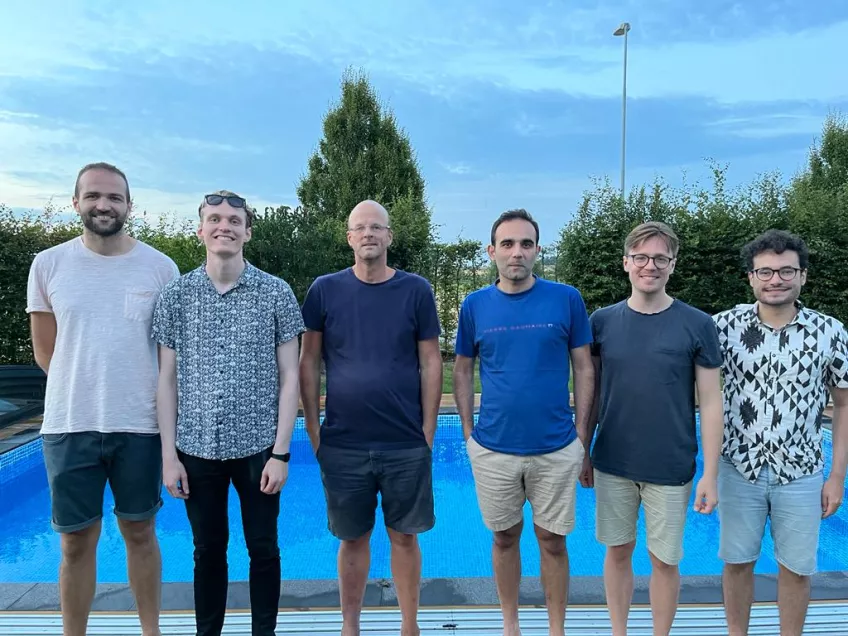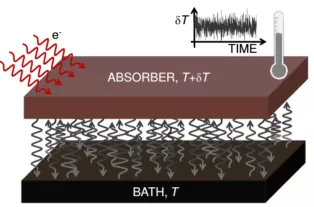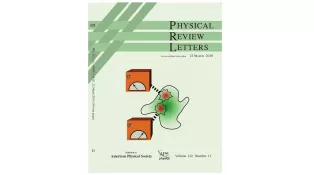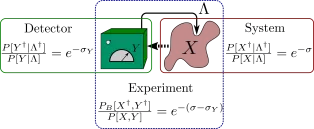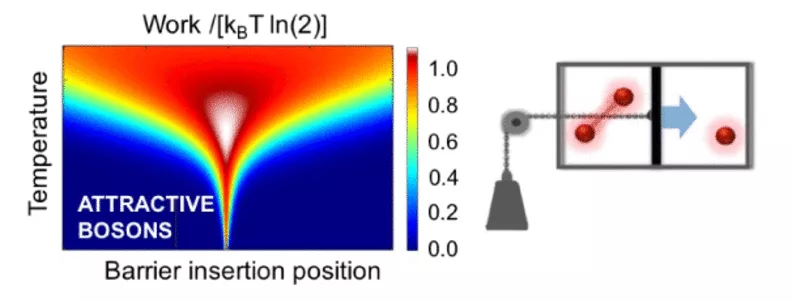Mesoscopic Physics Group
In the Mesoscopic Physics Group, we are working towards a better understanding of nanoscale systems, where
phase coherence meets fluctuations. Our goal thereby is to accelerate and contribute to the development of
quantum technologies which make use of intriguing quantum features such as coherence and entanglement.
Read more about our research here.
Members
- Peter Samuelsson, Group Leader
- Morten Munk, Postdoc
- Kalle Kansanen, Postdoc
- Björn Annby-Andersson, PhD Student
- Drilon Zenelaj, PhD Student
- Francesco Diotallevi, Master Student
- Daniel Elgbro, Bachelor Student
- Benjamin van Dijk, Bachelor Student
- Jian Li, Bachelor Student
Highlights
Quantum Fokker-Planck Master Equation for Continuous Feedback Control
Phys. Rev. Lett. 129, 050401 (2022)
Measurement and feedback control are essential features of quantum science, with applications ranging from quantum technology protocols to information-to-work conversion in quantum thermodynamics. Theoretical descriptions of feedback control are typically given in terms of stochastic equations requiring numerical solutions, or are limited to linear feedback protocols. Here we present a formalism for continuous quantum measurement and feedback, both linear and nonlinear. Our main result is a quantum Fokker-Planck master equation describing the joint dynamics of a quantum system and a detector with finite bandwidth. For fast measurements, we derive a Markovian master equation for the system alone, amenable to analytical treatment. We illustrate our formalism by investigating two basic information engines, one quantum and one classical.
Efficient and continuous microwave photoconversion in hybrid cavity-semiconductor nanowire double quantum dot diodes
Nat. Commun. 12, 5130 (2021)
Converting incoming photons to electrical current is the key operation principle of optical photodetectors and it enables a host of emerging quantum information technologies. The leading approach for continuous and efficient detection in the optical domain builds on semiconductor photodiodes. However, there is a paucity of efficient and continuous photon detectors in the microwave regime, because photon energies are four to five orders of magnitude lower therein and conventional photodiodes do not have that sensitivity. Here we tackle this gap and demonstrate how microwave photons can be efficiently and continuously converted to electrical current in a high-quality, semiconducting nanowire double quantum dot resonantly coupled to a cavity. In particular, in our photodiode device, an absorbed photon gives rise to a single electron tunneling through the double dot, with a conversion efficiency reaching 6%.
Reaching the ultimate energy resolution of a quantum detector
Nat. Commun. 11, 367 (2020)
Quantum calorimetry, the thermal measurement of quanta, is a method of choice for ultrasensitive radiation detection ranging from microwaves to gamma rays. The fundamental temperature fluctuations of the calorimeter, dictated by the coupling of it to the heat bath, set the ultimate lower bound of its energy resolution. Here we reach this limit of fundamental equilibrium fluctuations of temperature in a nanoscale electron calorimeter, exchanging energy with the phonon bath at very low temperatures.
Certifying Nonclassical Behavior for Negative Keldysh Quasiprobabilities
Phys. Rev. Lett. 122, 110401 (2019)
Measurements in quantum mechanics induce an unavoidable backaction on the system. As a consequence, multiple observables can in general not be described by a positive probability distribution. Here we provide an experimentally accessible inequality which serves as a test to certify if a description in terms of positive probabilities is possible. The inequality rests on a few natural assumptions on the measurement apparatus. This research was featured on the cover of Phys. Rev. Lett.
Detailed Fluctuation Relation for Arbitrary Measurement and Feedback
Phys. Rev. Lett. 121, 210603 (2018)
Fluctuation relations relate probabilities of forward experiments to probabilities of backward experiments. While the backward experiment is usually determined by time-reversal of the forward experiment, the presence of measurement and feedback introduces a certain freedom in choosing the backward experiment. Using this freedom, we provide a recipe for obtaining different fluctuation relations. We then use this recipe to find a particularly useful relation which overcomes problems encountered in previous approaches.
Supremacy of the quantum many-body Szilard engine with attractive bosons
Phys. Rev. Lett. 120, 100601 (2018)
We show that the work output of a Szilard engine containing a quantum gas of attractive bosons is superior to that generated by an engine containing non-interacting particles and that this supremacy increases significantly with particle number. Our work demonstrates an intricate interplay between quantum mechanics, thermodynamics and information theory and sheds light on a hitherto unexplored fundamental question that is relevant for a wide range of many-body quantum systems where interactions are important.
Former Members
Saulo Moreira, Postdoc, 2021-2023
Faraj Bakhshinezhad, Postdoc, 2020-2022
Patrick Potts, Postdoc, 2018-2021
Fredrik Brange, PhD Student until 2019
PhD Thesis: Quantum Correlations and Temperature Fluctuations in Nanoscale Systems
Sara Kheradsoud, PhD Student until 2019
PhD Thesis: Thermoelectric Effects and Single Electron Sources in Mesoscopic Transport; a Scattering Approach
Tineke van den Berg, Postdoc, 2013-2016
Ognjen Malkoc, PhD Student until 2016
PhD Thesis: Entanglement detection schemes and coherent manipulation of spin in quantum dots
Christian Bergenfeldt, PhD Student until 2014
PhD-thesis: Transport effects in hybrid circuit QED structures
Francesca Battista, PhD Student until 2013
PhD-thesis: Scattering approach to time-dependent charge and energy transport in mesoscopic conductors
Open Positions
Currently there are no open positions at our group.
However, motivated applicants for a PhD or Postdoc position are always welcome to peter [dot] samuelsson [at] teorfys [dot] lu [dot] se (contact me). Please include a CV, a list of publications, and a motivation letter in your application.


